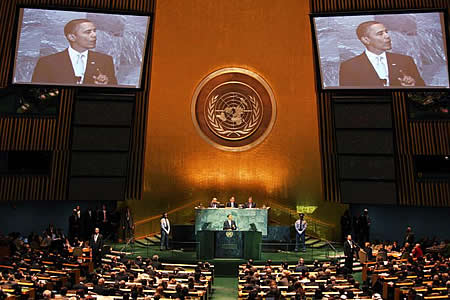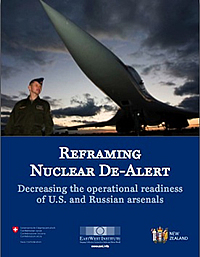Obama Asks UN De-Alerting Resolution to Wait
 |
| President Barack Obama, here shown speaking to the United Nations in September, is seeking to delay a UN Resolution calling for De-Alerting Nuclear Forces. |
.
By Hans M. Kristensen
The Obama administration has asked four countries to postpone a resolution at the United Nations calling for reducing the alert-level of nuclear weapons.
The intervention apparently is intended to avoid the Obama administration having to vote against the resolution before the important Non-Proliferation Treaty Review Conference in May 2010 — on an issue Barack Obama promised to support when he ran for president.
The resolution, which was last adopted by the U.N. General Assembly with overwhelming support on December 2, 2008, calls for “further practical steps to be taken to decrease the operational readiness of nuclear weapons systems, with a view to ensuring that all nuclear weapons are removed from high alert status.”
Obama’s De-Alerting Pledge
During the presidential election campaign, Barack Obama pledged that as president he would “work with Russia to take nuclear weapons off hair-trigger alert.” This pledge was part of the foreign policy agenda of the Obama for America campaign, and for several months after the election was part of the White House web site:
“The United States and Russia have thousands of nuclear weapons on hair-trigger alert. Barack Obama believes that we should take our nuclear weapons off hair-trigger alert – something that George W. Bush promised to do when he was campaigning for president in 2000. Maintaining this Cold War stance today is unnecessary and increases the risk of an accidental or unauthorized nuclear launch. As president, Obama will work with Russia to find common ground and bring significantly more weapons off hair-trigger alert.”
Apparently Russia has shown little interest in de-alerting, and the pledge has since disappeared from the White House web site and was not mentioned in President Obama’s speech in Prague in April this year.
The Nuclear Posture Review
The Obama administration is more than halfway through a Nuclear Posture Review (NPR) that is analyzing, among other issues, what alert level is appropriate for U.S. nuclear forces in the future.
Currently, virtually all of the 450 Minuteman III land-based intercontinental ballistic missiles are on alert with approximately 500 warheads. Another 96 Trident II sea-launched ballistic missiles with nearly 400 warheads are on alert onboard four of the nine-ten Ohio-class nuclear-powered ballistic missile submarines that are at sea at any given time.
Why U.S. national security 20 years after the Cold War ended still depends on the ability to launch nearly 900 nuclear warheads with 12 minutes (actually only four minutes for the ICBMs) is one of the great mysteries the NPR has to answer.
 |
| The EastWest Institute de-alerting report is worth reading. |
The long-range bombers were removed from nuclear alert in 1991 and – despite recent attempts to increase their readiness – will remain off alert with no detrimental impact on U.S. national security.
Reframing Nuclear De-Alert
The EastWest Institute has, with the support of the Swiss and New Zealand governments, just published a highly-recommendable study Reframing Nuclear De-Alert: Decreasing the Operational Readiness of U.S. and Russia Arsenals.
The study, which was briefed to the United Nations yesterday, does a good job of trying to elevate the de-alerting debate from whether or not nuclear alert should be called “hair-trigger alert” to actually considering practical steps for lowering the operational readiness of nuclear forces.
Whether the Obama administration’s request to postpone the U.N. resolution indicates that the NPR will recommend lowering the readiness of U.S. nuclear forces remains to be seen. But it will be truly disappointing if it does not.
This publication was made possible by a grant from Carnegie Corporation of New York and Ploughshares Fund. The statements made and views expressed are solely the responsibility of the author.
A military depot in central Belarus has recently been upgraded with additional security perimeters and an access point that indicate it could be intended for housing Russian nuclear warheads for Belarus’ Russia-supplied Iskander missile launchers.
The Indian government announced yesterday that it had conducted the first flight test of its Agni-5 ballistic missile “with Multiple Independently Targetable Re-Entry Vehicle (MIRV) technology.
While many are rightly concerned about Russia’s development of new nuclear-capable systems, fears of substantial nuclear increase may be overblown.
Despite modernization of Russian nuclear forces and warnings about an increase of especially shorter-range non-strategic warheads, we do not yet see such an increase as far as open sources indicate.